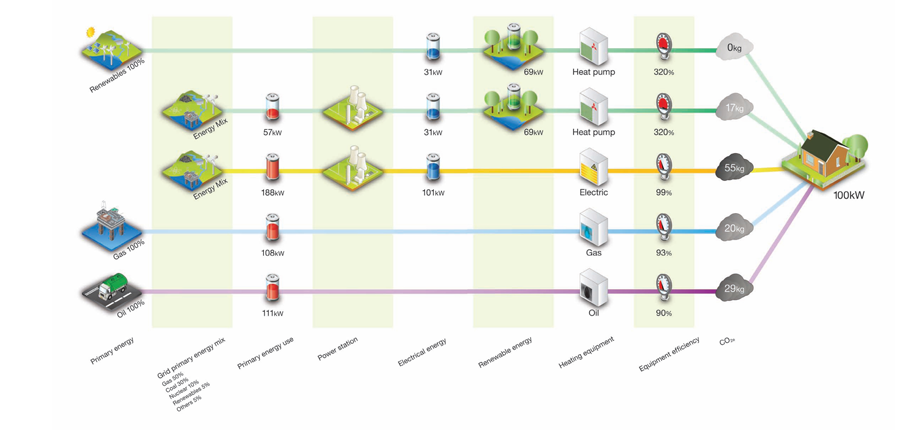As we start the year, renewable heating specialist Russell Dean from Mitsubishi Electric looks back at some of the major issues and topics from last year that point to a positive 2018.
If we put the ongoing trials and tribulations of Brexit to one side there were positive signs for the social housing industry last year such as November’s budget which focused on the Holy Trinity of housing, infrastructure and productivity
There are currently around 1.8 million households waiting for a social home – an increase of 81% since 1997, and two thirds of households on the waiting list have also been waiting for more than a year.

We’ve also seen an increase in homelessness and a rise in food banks so there is an urgent need for new affordable homes and the budget also sought to find initiatives designed to Britain build the 300,000 homes a year we need.
At the same time we need to ensure that these new homes are built with the future in mind, so we don’t find ourselves retrofitting all these same properties again in 20 – 30 years to help them get near zero emissions targets.
Clean Growth Strategy
In October, the long awaited Clean Growth Strategy set out how the UK will cut emissions, increase efficiency and help lower the costs of energy to consumers and businesses.
The strategy encompasses how we heat our homes, power our cars and run the National Grid with the government pointing to support of £3.6 billion of investment to upgrade a million homes through the Energy Company Obligation (ECO).
The strategy also states that the Building Regulations will be strengthened around energy performance standards for new and existing homes.
A golden age for renewables
Going right back to start of the year, 2017 began with new tariffs for the Domestic Renewable Heat Incentive (RHI) – and this saw the rate for air source heat pumps receiving the biggest increase across renewable technologies, up 33% (from 7.51p/kWh to 10.02p/kWh).
Heat pumps have been recognised by the government as one of the quickest and most straightforward ways of introducing renewable heating to a home, with predictions of annual sales of one million heat pumps by 2030.
They are therefore seen as a major part of the solution to helping tackling fuel poverty by helping lower fuels bills, and also helping the nation reduce its overall carbon emissions.
The truly electric economy
In April 2017 the UK generated a whole day of electricity without needing to use coal-fired power stations. This landmark moment was the first working day since 1882, when no coal has been needed to help supply power to the nation. It won’t be the last.
As the grid gets greener, heating with air source heat pumps also becomes greener, with a reduction in carbon footprint from 17kg to 0kg – zero. Compare this with gas at 20kg and oil at 29kg.
The government’s clean growth strategy refers to “Heat decarbonisation” including the electrification of heating as the nation’s homes transition from gas boilers to electric heat pumps. If we are to tackle the worst effects of climate change then by 2050, we will need to fully decarbonise how we heat homes.
This means tackling older properties and many social housing providers are now factoring the regular RHI payments they can receive after fitting heat pumps, into their annual improvement programme. This then helps fund future programmes to upgrade doors, windows, insulation and bring renewable heating to even more homes.
So there is a real opportunity and a sense of momentum to the year ahead that points to a busy time for this sector.
Russell Dean is National Sales Manager for the Ecodan range of Renewable Heating
Warwickshire homes combine market-leading technologies
A new housing development in Warwickshire is combining Passivhaus building techniques with air source heat pumps designed specifically for the different heat loads of new-build properties.
These cutting edge technologies will be helping to keep residents warm in what is said to be the first Passivhaus affordable homes in Warwickshire.
Warwickshire Rural Housing Association (WRHA) is currently developing the ground-breaking Passivhaus scheme in Wootton Wawen, in partnership with Waterloo Housing Group and developer, Bouygues UK.
WRHA is working with market-leading heat pump manufacturer, Mitsubishi Electric to provide the 14 properties with the latest renewable air source heat pumps to fuel their heating and hot water, in place of a traditional boiler.
The heat pumps have been designed specifically to address the heating needs of new-build homes, which have a very different requirement from existing properties. With superb levels of insulation, they need much less heating but still require hot water whenever the homeowner needs it.
“The days of carbon-intensive heating such as gas and oil are rapidly coming to an end and we need solutions just like this development which combine the very best building techniques with the latest renewable forms of heating,” comments Wilby Meadows, Regional Sales Manager – Renewable Heating for the manufacturer.
“This energy efficient housing development will not only help ensure running costs are kept to a minimum for residents, but will also reduce the carbon footprint of the development.”
http://ecodanerp.co.uk
- Log in to post comments















